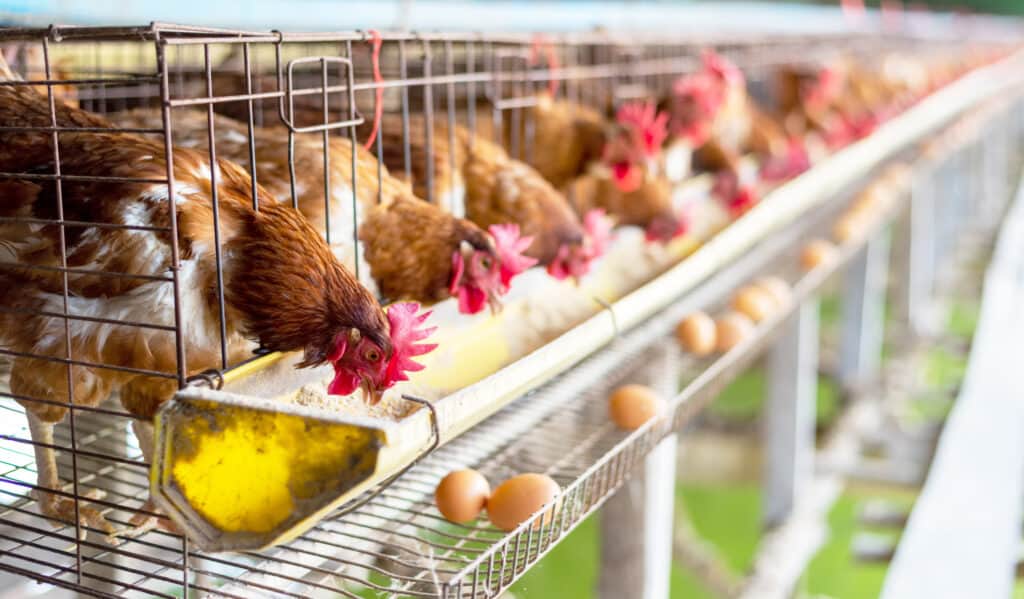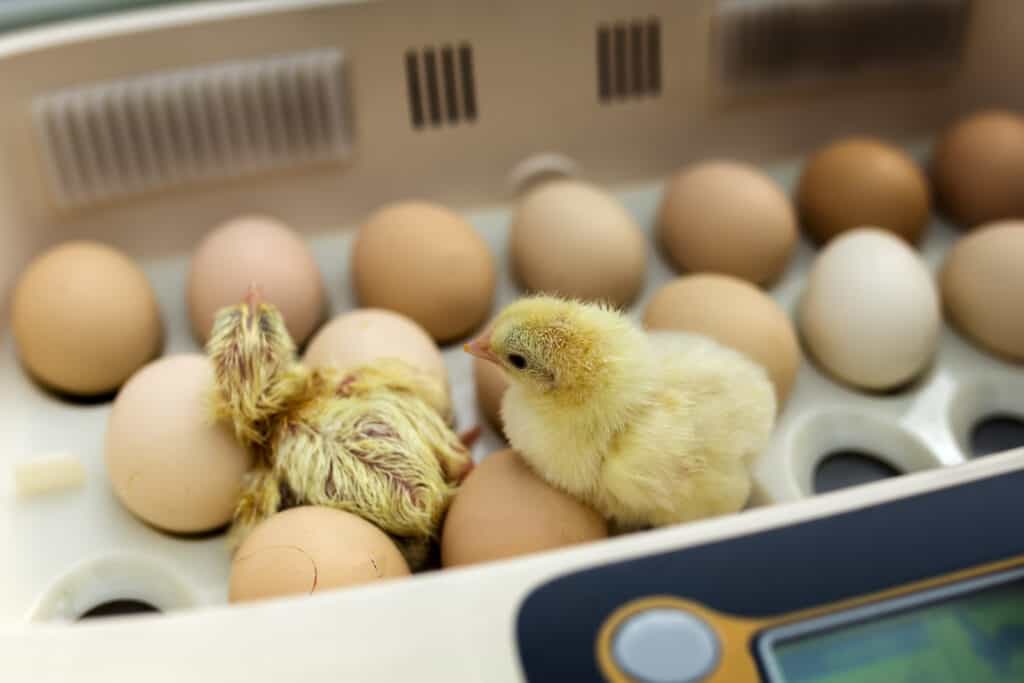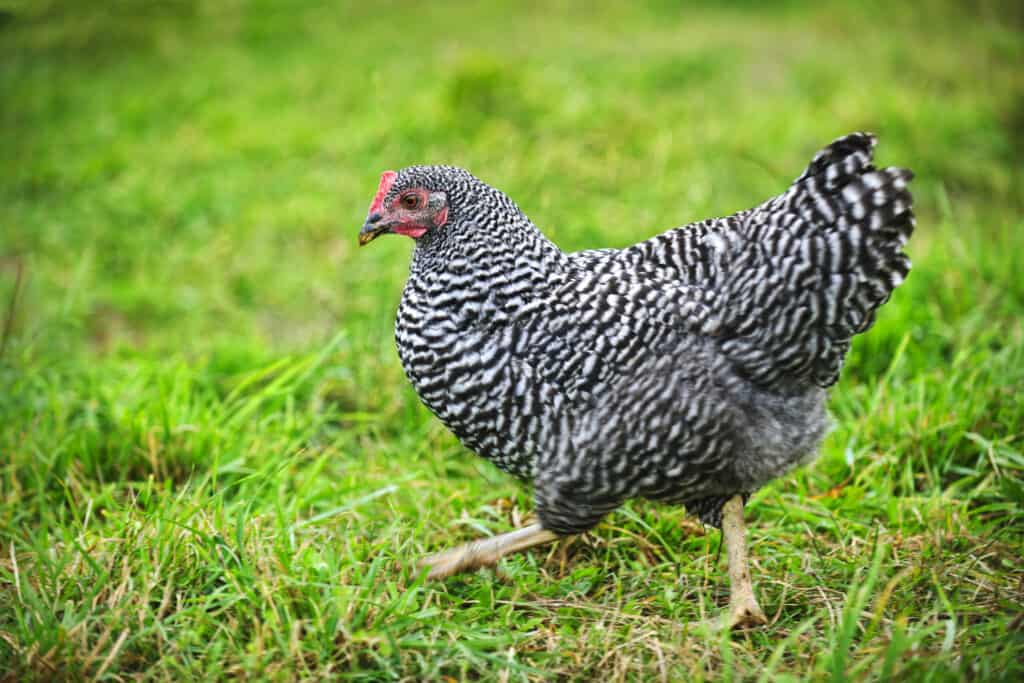It can be tricky to add new additions to your flock. You may wonder if you should buy new chicks or try to hatch them yourself. Before you begin hatching, you’re off to the right start! You are already researching the different ways to hatch eggs.
There can be a lot of factors to consider when hatching eggs. Broody hens and incubators are the two methods that will produce the best results. You may wonder if a hen can do a better job than an incubator. The answer isn’t as simple as that.
However, you’ll identify critical differences and benefits of both. This article will have you well on your way to choosing the best option for your hatching needs, as well as finding out which one has higher hatch rates.

Determining How to Maximize Your Egg Yield Isn’t Straightforward
©SasinTipchai/Shutterstock.com
What is a Brooder Hen?
Every hen has a natural tendency to become broody at any time, which causes them to want to sit on and hatch eggs. A hen may become broody for various reasons, including hormones, instinct, and maturity, so it is impossible to pinpoint the exact cause. A broody hen will end up settling into her desired nest box and become aggravated if you try to disturb her.
She might remove the feathers from her breasts and use them in her nest. If you try to move her, her feathers will ruffle, and she will screech at you in protest. You might even get a peck on the hand as a bonus! She will stop laying eggs once she has between 8 and 12 eggs under her (this may take a few days, or she may steal her flockmate’s eggs).
She won’t leave her nest and won’t even let her flock roost there at night. It is hard to find an excellent brooding chicken because many of them have been bred not to have this natural inclination. This is because the egg industry and those who sell eggs don’t want to fight a brooder when they aren’t looking to have baby chicks.
What’s an Incubator?
An egg incubator is a device that produces the ideal conditions for an egg to incubate and hatch successfully. An egg incubator is made to maintain the ideal humidity and temperature levels during incubation. It mimics the function that the broody hen performs in nature. Some incubators are made strictly for hatching.
An incubator that combines the hatching and setting phases is called a combo incubator. Some distinctive designs combine a setter and a hatcher into a single object. When incubating and hatching fewer eggs, combo units perform well. Using different setters and hatchers becomes preferable once production reaches a certain point.
Some egg incubators do most of the work for you, like auto-rotating them. If you’re using one of those, make sure it has an auto shut off for day 18. That is important so the chicks can position themselves for the hatching process and not become disoriented. Another often helpful addition is that they can have egg-candling lights built into them to check the development of the eggs.

Egg Incubators Maintain Ideal Conditions and Temperatures Hatching Eggs
©Ivan Kurmyshov/Shutterstock.com
What Are the Benefits of Having a Brooder Hen?
The incubator and brooder box are both the hen. No electricity or heat lamps are required! The hen turns the eggs, ensuring they rotate and spend an equal amount of time on each side. This also keeps them warm equally. She controls the humidity in the nest by removing her breast feathers to allow skin-to-egg contact. Broodies are said to be able to recognize non-fertile and non-developing eggs and will eject them from their nest without even lighting a candle on the eggs.
Even if only one chick hatches, it won’t be alone like a baby in a brooder because the mother hen will be there to keep it company. The mother hen will teach her chicks to drink, what to eat, where to find bugs, the dangers of predators, and how to take dust baths.
In just a few days, a good broody could take her chicks outside for brief “field trips,” allowing them to be exposed to the pathogens and bacteria in the environment and start to develop strong immune systems. Once the chicks can leave the coop, other chickens won’t be as inclined to start trouble. This is because they are used to them being around inside the enclosure.

Brooder Hens Have Evolved To Incubate Eggs
©iStock.com/Elenathewise
What Are the Benefits of Using an incubator?
You are not restricted to only the times when you have a broody hen; you can hatch whenever you want. Winter isn’t off limits with an incubator. The temperature and humidity are in your control. The clear top of the incubator usually allows you to see the chick’s hatch, which is generally not possible when using a hen because she is sitting on the eggs.
This can let you monitor them closely or just enjoy the experience more thoroughly. Being able to see the process can help you save the weaker chicks. Sometimes they try to zip the egg but run out of strength and need intervention.
Often they catch up to their siblings with a bit of extra care and a great diet. You can hatch more eggs at once than under a broody hen, depending on the size of your incubator. In the incubator (and brooder box) inside your home, your eggs (and chicks) are protected from predators and flock members.
Disadvantages of a Brooder Hen
You can only hatch eggs in the spring or summer. There is limited space available for the hen to hatch effectively. Having fertile eggs on hand while you have a broody hen can take some coordination, as timing your hatch can be tricky because you can’t ‘force’ a hen to go broody.
An incubator should be your backup plan if your hens decide to give up on the nest before the full 21 days. You should always have an indoor brooder box on hand just in case. Not all broodies make good mothers, and once the chicks hatch, they sometimes lose interest in taking care of them or, worse, injure or kill them.
You must ensure the nest your broody has built is safe because the hatching eggs and baby chicks are vulnerable to predators like rats and snakes, and other flock members. Once the chicks hatch, you must move them to a secure crate, cage, or pen inside a coop.
What Are The Disadvantages Of An Incubator?
A good incubator costs money. You will need to hand-turn each egg several times daily if your incubator doesn’t have an automatic turner. Monitor the temperature and humidity while maintaining an adequate water supply.
You might lose your entire hatch if the power goes out. There are incubators with a backup power supply attachment, but you will have to buy the battery separately most of the time. After your chicks hatch, you’ll need to get a brooder ready for them and be prepared to clean it frequently.
Another thing is a heat lamp for your brooder, which you must monitor, and once more, have a backup plan, so chicks don’t get cold in the event of a power outage. The chicks will likely stay indoors until they are at least 8 weeks old. Then they will spend a few weeks apart from the rest of the flock while getting used to one another.
Which One Hatches The Most Eggs?
Incubators and brooding hens are both great at hatching eggs. The rate of success varies on how humans take care of the eggs and how brooders do. Your situation and amount of eggs will determine the best outcome for each one. If you only need around eight eggs hatched, and you know your hen will stay on them, this will lighten your workload drastically.
However, an incubator is better if you want to hatch over ten eggs. This will allow you to have more chicks at ones that will be the same age group. That can be helpful, so you don’t have bickering small chickens of various ages. A successful hatch rate is around 80% of the number of eggs incubated.
The rate is valid for brooders too. If you are attempting to use a new brooder, then having an incubator on stand-by is vital in case she isn’t cut out for the job. Researching and maintaining the right environment will improve hatch rates significantly regardless of where the eggs are incubated.
Up Next:
- The Best Heat Lamp For Your Chickens for 2022
- The Best Vitamins for Chickens: Happy and Healthy in 2022
- Chicken Lifespan: How Long Do Chickens Live?
The photo featured at the top of this post is © Drakuliren/Shutterstock.com
Sources
- , Available here: https://www.theprairiehomestead.com/2018/11/broody-hens.html
- , Available here: https://www.surehatch.co.za/pages/incubator-terminology-explained
- , Available here: https://www.backyardchickens.com/articles/broody-hens-vs-incubators-the-pros-and-cons.64534/#:~:text=A%20broody%20hen%20can%20only,amount%20is%20around%208%20eggs.
- , Available here: https://104homestead.com/boody-vs-incubator/
FAQs (Frequently Asked Questions)
Should I worry if the eggs don't hatch on day 21?
Not at all. Chicken eggs typically begin to pip at day 21, but starting later is not uncommon. The time until hatching can be affected by many different factors. Some eggs can hatch at 18 some day 23. The majority will happen on day 21.
What temperature should an incubator be at?
100–102°Faherenheit should be the incubator’s temperature. 99°F is acceptable in some incubators. Embryos will perish at temperatures of 103°F or higher.
Thank you for reading! Have some feedback for us? Contact the AZ Animals editorial team.






